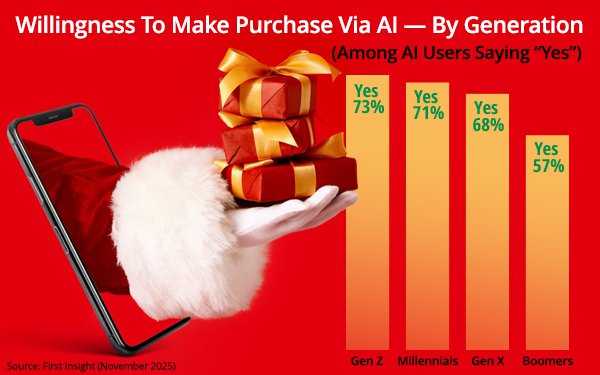
Instant checkout on platforms like
ChatGPT was one of the first features to emerge from a recent wave of partnerships between AI and ecommerce companies.
Now companies like Google, which released several shopping agents this week, want consumers to hand off the more tedious
tasks to agentic technology. It’s not clear whether consumers are willing to go all in.
Nearly four in 10 consumers participating in the 2025 Holiday Shopping Report from First Insight
note they intend to use AI tools like ChatGPT, Gemini and Claude to assist in their holiday shopping, and 68% of them plan to go from browsing to buying directly within the platform -- compared with
42% of shoppers who plan to do the same on social media.
advertisement
advertisement
The 2025 Holiday Shopping Report is based on responses from 1,145 U.S. consumers ages 18 to over 80.
Findings from First
Insight -- which uses AI to analyze consumer feedback to build retail strategies -- identified that AI-driven shopping is especially prevalent among Gen Z shoppers, with 73% saying they will use AI
for everything from product discovery to purchase.
Most shoppers will not be increasing their budgets this year, and all said they would look for at least the same or better prices.
Seventy-four percent said they will spend the same or less than last year on gifts, but 41% said they will buy fewer items overall.
Fifty-eight percent cited price and deals, and 47% cited
ease of shopping and convenience as top reasons for shopping in-store, while the same factors -- 55% and 47%, respectively -- were cited as motivations for online purchases.
For holiday
shopping research, 59% of consumers participating in the survey turn to Facebook, 54% to TikTok, and 52% to YouTube. Facebook at 59% and TikTok at 54% lead when it comes to completing purchases,
followed by 47% with Instagram.
Nearly three-quarters of consumers, or 74%, said they will spend the same amount or less than last year, with 41% saying they plan to buy fewer items
overall, and 23% seeking deals. Eighty percent of shoppers say they would need at least a 15% discount to consider buying a product this year.
The approach to engaging consumers has
evolved this holiday season, as agentic technologies enable searches, discovery, and purchases to become increasingly autonomous. But the ability to analyze the numbers and build audiences in real
time will increase performance.
One option brands now have is to quickly find these audiences through an emerging trend in agentic and cloud services.
Newton Research claims it
has become the only live agentic AI measurement company that has trained its models to do tasks such as media mix modeling (MMM), forecasting, incrementality, and campaign reporting.
Doing so
has helped make agentic analytics in the cloud affordable for smaller businesses to reach targeted audiences.
Newton recently partnered with Snowflake, a cloud service provider, and integrated
its agentic technology into Cortex AI. The companies boasted that it made campaign measurement and analytics more affordable, scalable and accessible for smaller companies, not just those with deep
budgets like Proctor and Gamble.
Previously, only the largest brands had the financial ability to perform sophisticated campaign and marketing measurements.
John Hoctor,
co-founder and CEO at Newton Research, told MediaPost that agentic “makes it possible for all brands to make more accurate media buying decisions."
More importantly, less technical users
can now manage analytics.
"It was very expensive, complex and manually intensive," he said. "Sophisticated analytics also required a dedicated team of measurement experts, making it
prohibitive for most brands to regularly perform rich campaign analyses and made it hard to apply insights directly to downstream workflows.
As analysis moves beyond basic market
segmentation to hyper-personalization for highly specific slivers of consumers, real-time data on browsing patterns and engagement history will allow AI agents to dynamically adjust ad content,
website displays, and offers, creating experiences for each shopper. It will even find those who are willing to make purchases through agentic buying systems.